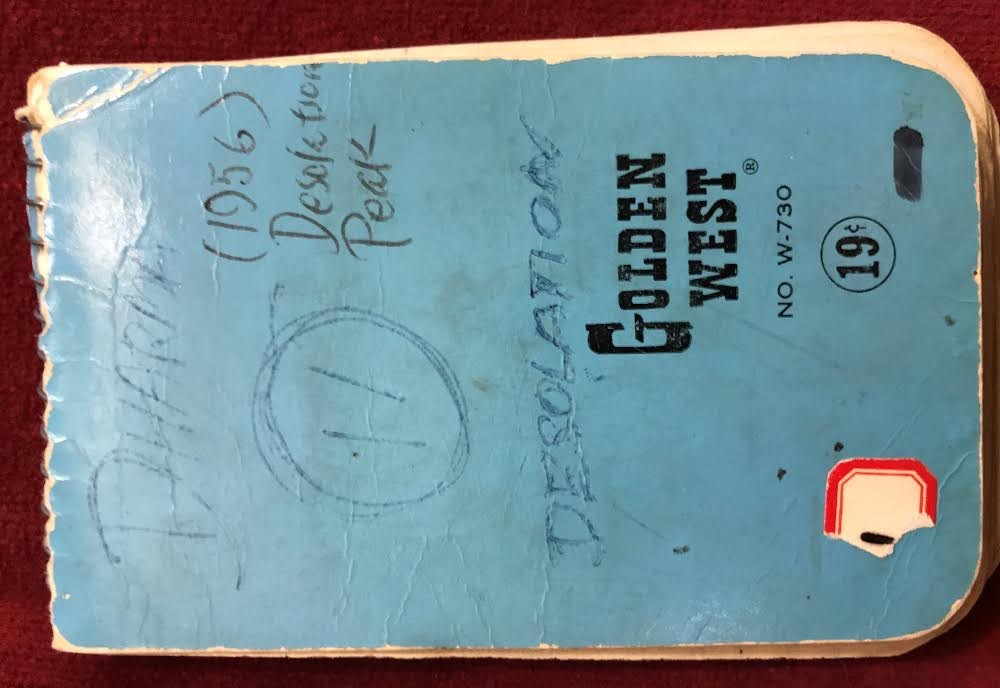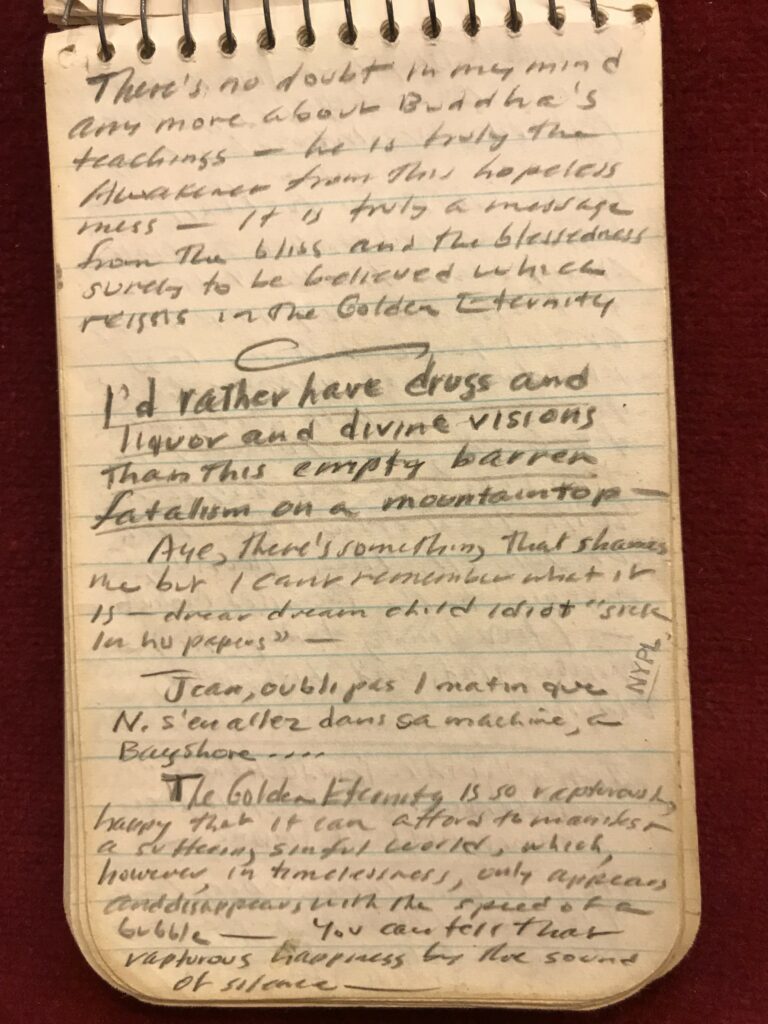
Jack Kerouac’s notebook. Image courtesy of the Jack Kerouac Estate.
Read any biography of Jack Kerouac and here’s essentially what you’ll learn: that in the summer of 1956 he spent two months in a mountaintop shack as a fire lookout for the US Forest Service in the North Cascades in Washington State, and nothing much happened. Mostly he was bored.
Jack’s experience on Desolation Peak marked the climax of his involvement with Buddhism and of a decade of restless travel; it’s the high point of his journeying and spiritual seeking. A voracious reader, he nevertheless chose to go up the mountain without any books, only his personally typed copy of the Diamond Sutra, which he planned to read every day and transcribe yet again, this time in language more accessible to American readers, in order to achieve the enlightenment that he was certain would result. The extent of his solitude, thus, was acute. There were no radio stations from the outside world to tune into. No electricity. No running water. And most radically for Jack, two months without alcohol. It was his last, best chance to change the trajectory of his life, to avoid the alcoholic downfall that accelerated a year later with the instant celebrity from On the Road’s publication and that would ultimately kill him at age forty-seven.
The following excerpts six pages from the one-hundred-and-eighty-page diary Kerouac kept during that time.
—Charles Shutterworth
Page 2
I will now write supreme book that will astound both Cowley & Giroux, a respected work now, like Town & City, to save & to exfoliate America & religious light & generation—If I find shack in Cascades I’ll stay there winter,—Big German police dog trots around my crate yard—Everything, 20,000 of it, is belonging to me because I am awake (“because I have my fish tail” says Claude)—Peter hanging out sleeping bags now in McCorkle’s shack—“It Happened In Mill Valley.” my enlightenment happiness—Nuff prose—
The machine wheels
turn straps
Tree leaves away
Page 10
Flowers
in the lunchroom
—Wednesday June 20Napoleon in bronze—
the burning Blakean
MountainsChow dog, Chinese
woman—
China cock crowsVelvet horses
in the valley Auction
—Woman singsTalk of eaters
low at table
—Clink, clackStraw in paper
glasswater shivers
—Spoon in glass
(Haiku longstyle)
Page 11
SEATTLE NEXT MORN
My Diamond Sutra said that there’s nothing but snowy white mystery—read it in a hush silence 15 ft ceilinged skidrow room smoking a butt at 8:30 AM, felt that old Diamond Feeling
Poor tortured teeth
under
The blue sky
(Haiku thought on road with ride I got from J[unction]City, to clear to Portland, little blond Jack Fitzgerald painter with splattered shoes & 4 cans of cold pint beer, we drank em & had another in a tavern with sweet sincere bartender)—In Portland we wailed on vast eternity bridge as draw went up to allow crane barge thru, big Montrealish smoky river city
Page 13
curvy woods roads to Naval Base Bremerton to 50¢ Seattle Ferry where I paid Okie Slim’s fare (65¢) then went on top deck in cold drizzle for one hour sailing to Port of Seattle & I found a half pint of vodka on deck concealed under a Time Magazine & drank some in cold wind as we came on thru Puget Sound, wild, lyrical,—Mt. Olympus & Mt. Baker I guess to be seen & I think even Mt. Hozomeen on all horizons, wild, an orange sash in the gloom only over the Hokkaido Siberian
Page 19
forest & no one was there to hear it wd it make any sound?”—And on & on, wild Buddha nature talk on all sides—I took dusk pace in old road in back, praying—Gotta put in 11 days of bunkhouse living till I get to my sweet hermitage—Too hot at lights out I went out & slept on grass awhile, finisht vodka, had a samadhi (drunken samadhi) of the tree who presented me his glittering diamond aspect full of forms & shot thru with regnant Tathagatas, one form an Assyrian king clown, perfect—diamond silence of Washington State—hold me on, Lord—decided on a month of solitude at any Matterhorn camp this October—then sweet solitariness in Mexico hut
Page 23
The tranquil and everlasting essence, whether traveling as water, or sitting as peaks, or setting as snow, or hillhairing as trees, or dancing as sunlight thru the leaves, or passing as trucks, or digesting dinners, or being digested, or as shoes, or as imaginary blossoms in empty space, or as empty space, or as wind, or as marching clouds, or as ululating mysterious visionstuff, is still (with or without words) the tranquil & everlasting essence—
Or as moss, or as bark, or as twigs, or as mud,
or as bird, or as noise,
or as whatness,
or as the smile of pitying milk—or as a dream
—it holds together—

Image courtesy of the Jack Kerouac Estate.
Jack Kerouac (1922–1969) was born the youngest of three children in a Franco-American family in Lowell, Massachusetts. He attended local Catholic and public schools and won a scholarship to Columbia University in New York City, where he first met Neal Cassady, Allen Ginsberg, and William S. Burroughs. His first novel, The Town and the City, appeared in 1950, and On the Road, made him one of the most best-known writers of his time.
Charles Shuttleworth has been studying the work of Jack Kerouac since the late eighties. He currently teaches Kerouac and the Beats at the Harker School in San Jose.
This is an excerpt from Desolation Peak: Collected Writings by Jack Kerouac, with an introduction and notes by Charles Shuttleworth, which will be published by Rare Bird in November 2022.
from The Paris Review https://ift.tt/FxOqDcH
Comments
Post a Comment